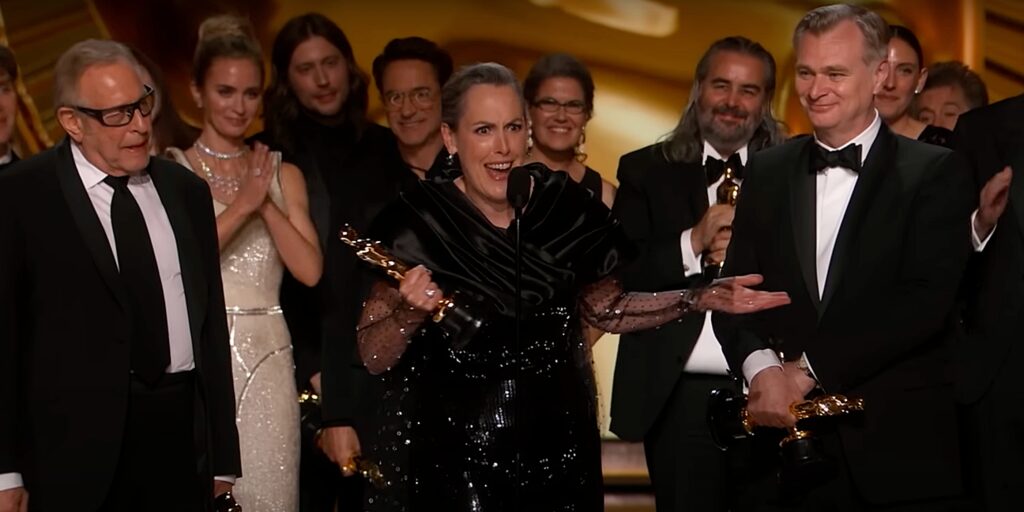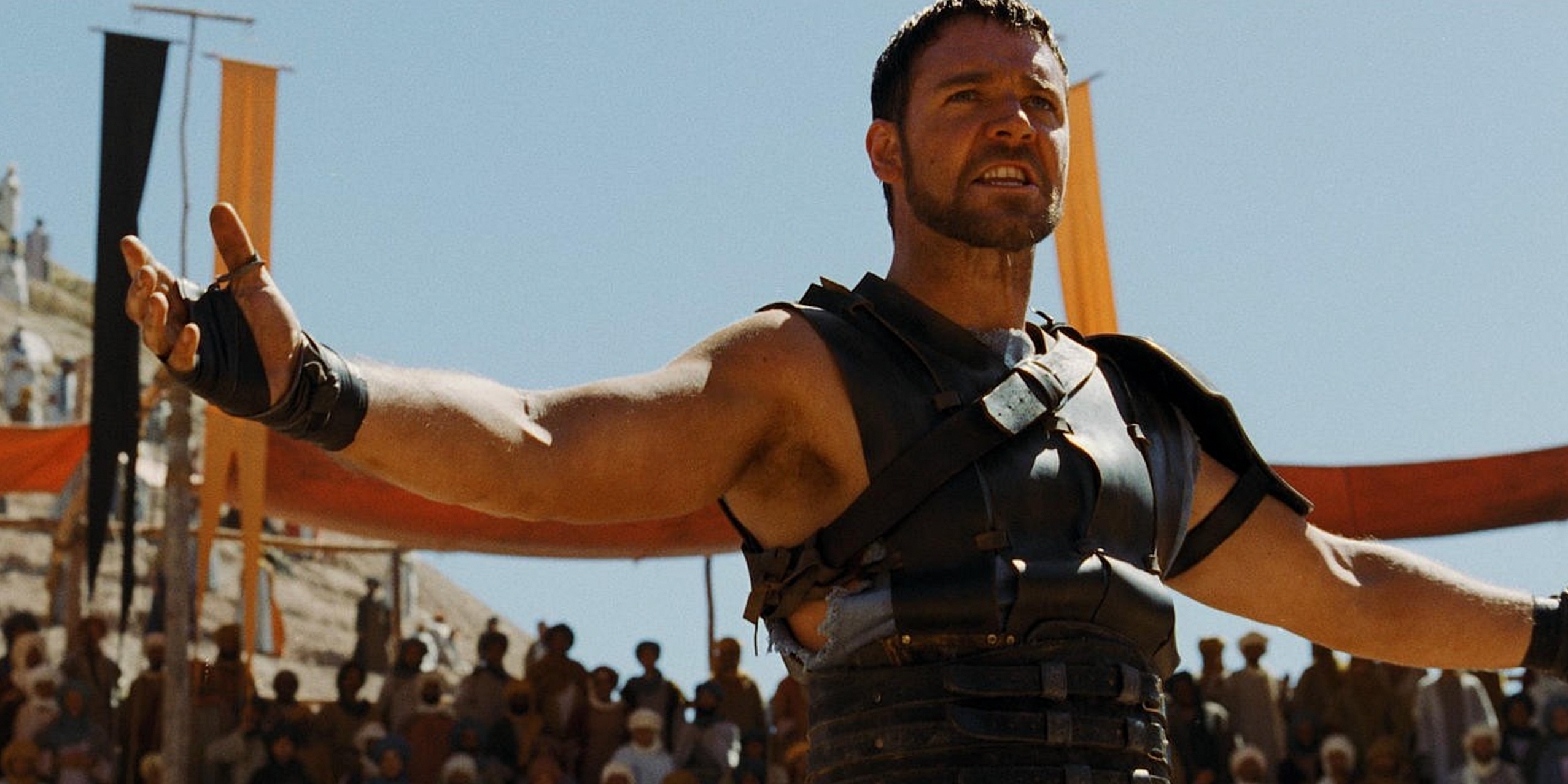There is no foolproof way to win a Best Picture Oscar. If there was, Netflix CCO Ted Sarandos would have paid mountains of diamonds for it by now. But, a pair of Oscar categories offer potential glimpses into which movies have serious Best Picture momentum. So far, in the 21st century, Best Original and Adapted Screenplay winners have often also won Best Picture. Only six of the 24 Best Picture winners of the century thus far (including “Oppenheimer,” the most recent winner) have scored the Academy’s biggest prize without a simultaneous screenplay win.
For comparison’s sake, nine 21st-century Best Picture Oscar wins failed to score simultaneous Best Director victories. What’s going on here? Why do modern Best Picture winners so often tie directly into the two screenplay categories, arguably more so than any other Oscar category? Like Oscar winner phenomena, this is a trend that can be chalked up to voters. There are reportedly 510 members of the writer voting block in the Academy, making up roughly six percent of the entire Academy voting block. That’s nearly the same number of voters as the director’s block and is vastly larger than many other Academy voting blocks. These voters can’t turn every screenplay Oscar winner into a Best Picture voter (Just ask “Belfast”). However, this is still a sizable group of artists whose influence matters.
Like Oscar winner phenomena, this is a trend that can be chalked up to voters. There are reportedly 510 members of the writer voting block in the Academy, making up roughly six percent of the entire Academy voting block. That’s nearly the same number of voters as the director’s block and is vastly larger than many other Academy voting blocks. These voters can’t turn every screenplay Oscar winner into a Best Picture voter (Just ask “Belfast”). However, this is still a sizable group of artists whose influence matters.
There’s also historical precedent for the affection for “proper” Best Picture winners spilling over into the screenplay categories. Many iconic Best Picture victors, ranging from “Casablanca” to “The Apartment” to “On the Waterfront,” also won screenplay Oscars. So, there’s a rich history of Best Picture and Screenplay Oscar winners going hand-in-hand. If a film has enough voter fervor to win Best Picture, that affection likely spills over into the writing categories.
This historical precedence can also be chalked up to which creative powers behind a film were once seen as the guiding creative hands of a project. The classical “auteur theory” established by the French and popularized in the 1960s conveyed that the director was the figure molding every major movie. Before then, though, directors were often invisible to both mainstream moviegoers and even Oscar voters. Producers and writers were the folks who received the lion’s share of the credit. The latter profession especially benefited from the dialogue-driven nature of classic cinema. The complexities of who “defines” an individual movie have become more apparent in the last 60 years. However, old habits can die hard. It wouldn’t be surprising if classical perceptions of screenwriters inform how closely Oscar-winning screenplays correlate to Best Picture winners.
That phenomenon is even powerful enough to lift Best Picture winners that don’t win armies of additional Oscars. Just look at “Crash,” “Spotlight,” and “CODA” (among 21st century Oscar winners). None of these films took home more than three Oscars each (“Spotlight” only won two). Even without dominating the technical categories, though, these movies reaffirmed their viability through prestigious Original/Adapted Screenplay wins. In fact, the only non-Best Picture Oscar that “Spotlight” won was Original Screenplay. So, if a film can win over the writers, Best Picture is not out of reach. Considering these elements, it’s worth asking how six 21st-century movies won Best Picture Oscars without scoring screenplay wins. To answer that, it’s worth noting what those six motion pictures were: “Gladiator,” “Chicago,” “Million Dollar Baby,” “The Artist,” “The Shape of Water,” and “Oppenheimer.” Interestingly, half of this group came from the first five years of the new century. This trend suggests that Oscar voters have become increasingly enamored with the idea that “best screenwriting equals best movie.”
Considering these elements, it’s worth asking how six 21st-century movies won Best Picture Oscars without scoring screenplay wins. To answer that, it’s worth noting what those six motion pictures were: “Gladiator,” “Chicago,” “Million Dollar Baby,” “The Artist,” “The Shape of Water,” and “Oppenheimer.” Interestingly, half of this group came from the first five years of the new century. This trend suggests that Oscar voters have become increasingly enamored with the idea that “best screenwriting equals best movie.”
Among those six movies, all but one (“Million Dollar Baby”) were visually extravagant exercises. Emphasizing grand scale may have led some Oscar voters to see many of these movies as “spectacle-oriented” productions. Traditionally, such projects are viewed as more worthy of visual effects victories than screenplay wins. Those lavish, image-based qualities led to several titles dominating the technical categories. “Gladiator” won Oscars for Best Visual Effects and Costume Design, and “Chicago” took home trophies for Best Art Direction and Costume Design. Even without screenplay triumphs, these titles built up Best Picture momentum through their craft wins.
Other 21st-century Best Picture winners built up goodwill by appealing to the largest Oscar voting block: actors. If a film can’t win over the writers, then it should appeal to the performers. “Million Dollar Baby,” for instance, was beaten in Best Adapted Screenplay by “Sideways.” However, the former film took home two Oscar wins for acting. Similarly, “Oppenheimer” also lost the Best Adapted Screenplay category; however, it reaffirmed its pull with Oscar voters by securing acting wins for Robert Downey Jr. and Cillian Murphy. If a film loses ground in the screenplay categories, all hope is not lost. Acting categories are great places for potential Best Picture winners to gain more traction.
Screenplay wins aren’t the only major Oscar domain from which these Best Picture winners can get excluded. Two members of this group of Best Picture victors failed to win in another big Oscar category: Best Director. “Million Dollar Baby,” “The Artist,” “The Shape of Water,” and “Oppenheimer” each compensated for their respective screenplay losses by securing Best Director victories. Only two 21st-century films (“Gladiator” and “Chicago”) secured Best Picture wins without also triumphing in either the Screenplay or Director categories. The fact that those two appealed to older voters by channeling vintage Hollywood genres likely helped make up for notable Oscar losses. In the grand scheme of things, the track record of 21st-century Best Picture Oscar winners in the screenplay categories is a bit scattered. Movies can win these awards by the slimmest of margins or other incidental factors. This doesn’t necessarily reflect the larger trajectory of how Oscar voters determine a “worthy” Best Picture winner. Still, the tight modern correlation between these categories tantalizes the minds of Oscar trivia devotees. Such extreme overlap suggests that the Academy values a compelling script when choosing Best Picture winners.
In the grand scheme of things, the track record of 21st-century Best Picture Oscar winners in the screenplay categories is a bit scattered. Movies can win these awards by the slimmest of margins or other incidental factors. This doesn’t necessarily reflect the larger trajectory of how Oscar voters determine a “worthy” Best Picture winner. Still, the tight modern correlation between these categories tantalizes the minds of Oscar trivia devotees. Such extreme overlap suggests that the Academy values a compelling script when choosing Best Picture winners.
By understanding all of this, one can potentially gain a better window into the minds of Oscar voters and maybe get a leg up in next year’s Oscars betting pool. One needs a script to get a movie off the ground in the first place. Judging by the majority of 21st-century Best Picture winners, one also needs a top-caliber screenplay to go all the way on Oscar night.
Do you believe winning Screenplay is key to winning Best Picture? Please let us know in the comments section below or on Next Best Picture’s Twitter account.
You can follow Lisa and hear more of her thoughts on the Oscars & Film on her portfolio here


